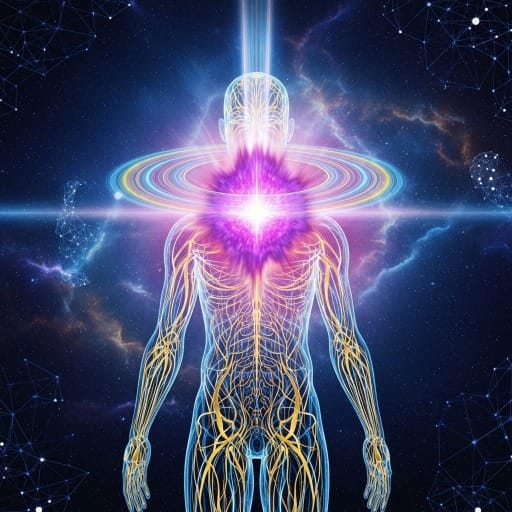All humanity is one undivided and indivisible family.
Mahatma Gandhi envisioned humanity as an indivisible family, emphasizing unity and collective responsibility. His teachings, rooted in non-violence and ethical living, encourage empathy, social justice, and interconnectedness.

Key Takeaways
- Mahatma Gandhi envisioned humanity as one indivisible family, calling for unity, compassion, and collective responsibility.
- His philosophy encourages us to transcend superficial differences and embrace interconnectedness, recognizing shared humanity and fostering collective responsibility.
- Gandhi's principles of ahimsa (non-violence), satyagraha (truth force), and swaraj (self-rule) aim for societal transformation and ethical living.
- Despite the inspiring nature of Gandhi's vision, it faces challenges, including nationalism, economic disparities, and critiques of the applicability of nonviolent resistance.
- Applying Gandhi's teachings today involves cultivating empathy, promoting justice, and recognizing our interconnectedness through practical actions.
🧘Timeless Lessons from Mahatma Gandhi: Embracing Our Shared Humanity
🫂Gandhi's Vision: Humanity as One Indivisible Family.
A pivotal figure in history, Mahatma Gandhi envisioned a world in which humanity would function as a cohesive, peaceful family.
💡Have you ever felt deeply connected to someone vastly different from yourself, or perhaps felt alienated by the divisions marking our world? In such moments, the timeless wisdom of Mahatma Gandhi offers a powerful beacon of hope. His profound message, "All humanity is one undivided and indivisible family, and each one of us is responsible for the misdeeds of all others," resonates deeply today, calling for unity, compassion, and collective responsibility. Gandhi's philosophy wasn't developed in isolation; it grew from deep spiritual and ethical roots, viewing life as an integral whole where religion (Dharma – encompassing not just moral obligation, but one's intrinsic nature and duty within the cosmic order) should pervade all activities. He was profoundly shaped by the Bhagavad Gita, which he referred to as his "eternal mother"; its teachings on non-attachment (anāsakti) were crucial in shaping his ideal of selfless action. Thinkers like Leo Tolstoy, in works such as "The Kingdom of God is Within You," reinforced his belief in the power of love and inner truth over external force. At the same time, John Ruskin's "Unto This Last" profoundly influenced his views on the dignity of labor and economic justice – insights that inspired practical experiments, such as the Phoenix and Tolstoy Ashrams in South Africa. By delving into Gandhi's philosophy of oneness—exploring its core concepts, historical context, implications, challenges, and practical applications—this post aims to offer both inspiration and tangible insights into how we can embody these vital teachings for a more interconnected and harmonious world today.
🌟 The Essence of Human Oneness: Beyond Superficial Differences
At its core, Gandhi's message urges us to look beyond superficial differences – such as nationality, religion, ethnicity, or social status – and recognize our fundamental shared humanity. This involves:
- Recognition of Shared Humanity: Acknowledging that all individuals possess everyday needs, emotions, aspirations, and inherent dignity. Think of the universal joy sparked by a baby's laughter or the shared human instinct to seek safety – these cut across all boundaries.
- Embracing Interconnectedness: Understanding that our lives, actions, and well-being are inextricably linked to those of others across the globe. Like threads in a vast tapestry, or perhaps like a spider's web where a tremor on one strand sends vibrations throughout the whole, what affects one part of the human family inevitably affects others.
- Fostering Collective Responsibility: Recognizing that global challenges like poverty, inequality, climate change, and pandemics are shared problems requiring collaborative solutions and mutual accountability. Consider how a single act of kindness can inspire others and have ripple effects, whereas negativity or inaction can spread. This echoes Gandhi's belief that each person is responsible for the misdeeds of others, underscoring the profound interconnection.
🌍 Gandhi's Vision: A World United in Action and Spirit
🕊️Gandhi's vision extended beyond individual sentiment to societal and political transformation, grounded in actionable principles. He advocated for:
- Ahimsa (Non-violence / Active Love): More than just the absence of violence, Ahimsa in its positive form means "the greatest love, the largest charity." It demands that one apply this love even to one's enemy, seeing it as intrinsically linked to truth and fearlessness. Gandhi developed Ahimsa as an active social technique to challenge injustice.
- Satyagraha (Truth Force / Soul Force): Literally "holding firmly to the truth," Satyagraha is the practical application of Ahimsa. It involves actively resisting untruth and injustice, using "soul force" rather than physical force. This "soul force" stems from the courage of conviction, the moral authority of a just cause, and the inherent power of truth itself. Think of the iconic Salt March, where thousands of people nonviolently defied the British salt tax —a simple act that embodied massive resistance. Its aim is not to defeat or punish the opponent but to convert and heal them through love, patience, and respectful dialogue, seeking a higher plane of shared understanding. It requires immense spiritual strength and courage.
- Tapasya (Self-Suffering): An essential element alongside Truth and Love, Tapasya involves voluntarily accepting suffering not for its own sake but as a demonstration of sincerity and a test of love. By accepting suffering without retaliation, the Satyagrahi aimed to prick the opponent's conscience, demonstrate the depth of their conviction, and inspire onlookers.
- Swaraj (Self-Rule): The ultimate goal of Swaraj is for individuals and communities to learn to govern themselves and achieve freedom—not only from external domination but also from internal mastery through the disciplined practice of Ahimsa and Satyagraha.
- Ethical Living in Society: Gandhi integrated these principles into daily life, famously identifying "Seven Social Sins." Consider 'Politics without Principles' – still relevant today when expediency overshadows integrity – or 'Commerce without Morality,' seen when profit motives harm people or the planet. He stressed that morality must underpin all societal activities, promoting global citizenship, international cooperation, and universal human rights as expressions of this unified vision.
🤔 Nuances and Challenges: Addressing Critiques and Complexities
❓While deeply inspiring, Gandhi's vision isn't without its hurdles. It's natural to feel discouraged when looking at the real-world challenges and complexities surrounding such a grand ideal. Acknowledging these difficulties is crucial for a realistic understanding:
- Persistent Divides:
- Tribalism and Nationalism: Deep-rooted tendencies to prioritize one's group or nation remain powerful, divisive forces, evident in ongoing global conflicts fueled by nationalist sentiment.
- Economic Disparities: Persistent global wealth inequality continues to spark debate, fuel resentment, and make the idea of a unified family seem distant to many.
- Cultural and Ideological Differences: In our interconnected world, diverse beliefs and values can lead to misunderstandings and conflict, sometimes amplified by social media dynamics, if not approached with careful dialogue.
- Gandhi's Own Struggles and Evolution: Gandhi himself wrestled with applying his universal ideals, making him a more relatable, complex historical figure:
- Swadeshi vs. Universalism: His emphasis on Swadeshi (serving immediate neighbors first) reveals a tension with pure universalism, perhaps reflecting a belief that change starts locally before spreading outwards.
- The Obligation Dilemma & South African Context: The ideal of the universal family can clash with immediate obligations, a conflict Gandhi experienced firsthand, leading to friction with his own family. Furthermore, his complex actions in South Africa—including seeking separate status for Indians and participating via a stretcher-bearer corps in the British suppression of the 1906 Zulu Rebellion—illustrate the problematic evolution of his thinking and the real-world challenges he faced in applying his principles consistently.
- Critiques of Satyagraha's Practicality: Some critics question the universal applicability of non-violent resistance:
- Political Realism: Satyagraha is argued to rely on a moral dialogue ('Gandhian dialectic') that may be ineffective against regimes wholly intolerant of dissent.
- Demands on Practitioners: Some critics see its success as requiring near-moral perfection, immense suffering, and potentially an indefinite timeframe, which may not be feasible in urgent crises.
- Optimism about Rationality: The philosophy is sometimes criticized for an overly optimistic view of human nature, which may be ill-equipped to address opponents lacking a shared moral compass.
- Focus on "Humanity": Some argue that an abstract focus on universal "humanity" could inadvertently devalue specific lives or struggles.
Addressing these inherent challenges and critiques requires sustained effort, open dialogue, critical self-reflection, and a commitment to understanding diverse perspectives.
🛤️ Practical Steps Towards a Connected Life: Cultivating Empathy and Justice
🌱Gandhi's philosophy is not just an ideal; it's a call to action. We can translate his vision into concrete steps:
- Cultivate Empathy and Compassion: Extend your feelings for others (empathy) into action (compassion). This involves:
- Practicing Active Listening: Truly hearing others' perspectives without judgment.
- Cultivating Curiosity: Genuinely wanting to understand people different from you. This week, try reading one article or listening to one podcast from a perspective you usually disagree with.
- Challenging Prejudices: Consciously Examining and Questioning Your Own Biases. Try striking up a brief conversation with someone in your community you usually wouldn't interact with, focusing on finding common ground.
- Seeking Commonalities: Finding Shared Ground Even in the Face of Differences.
- Experiencing Others' Lives: Gaining direct exposure to different realities through respectful interaction, perhaps by volunteering or attending community events outside your usual circle.
- Practicing Vulnerability: Being open about your own experiences can foster connection.
- Empathizing with Adversaries: Crucially, Gandhi advocated understanding the perspective, values, and suffering of opponents, seeing this as vital for peace, while recognizing that understanding does not require agreement.
- Using Gandhi's Talisman: When facing a decision, "Recall the face of the poorest and weakest man [whom] you may have seen, and ask yourself if the step you contemplate is going to be of any use to him." Imagine a community organizer facing a difficult decision about how to allocate limited resources. Remembering Gandhi's Talisman, she pictures the most vulnerable person she knows in the community—an elderly resident struggling with mobility. She asks herself, "Will this decision truly help her?" This empathetic check shifts her perspective, leading to a more equitable choice that prioritizes genuine needs.
- Promote Peace and Non-Violent Conflict Resolution:
- Engage in respectful Satyagraha-style dialogue, aiming to convert rather than conquer.
- Seek peaceful means to resolve conflicts in all spheres. Remember Gandhi's insight: "There is no way to peace; peace is the way."
- Work for Social and Economic Justice:
- Advocate for equality and fairness. Support ethical practices. Use your voice to promote human rights.
- Educate yourself and others about systemic injustices, which Gandhi viewed as man-made and requiring moral action.
- Live Mindfully and Simply:
- Practice mindfulness and cultivate gratitude. Consider reducing consumption – perhaps by choosing experiences over material goods, repairing items instead of replacing them, or supporting local, ethical businesses. Sharing resources could mean anything from lending a tool to a neighbor to donating time or money to effective causes.
Crucially, these individual practices—cultivating empathy, working for justice, and living mindfully—are interconnected. They are the threads we weave into the larger tapestry of a united humanity, strengthening our collective capacity for peace and cooperation.
🌐 Modern Manifestations of Interconnectedness
🔗Our modern world provides constant, often stark, reminders of our interconnectedness, evoking both anxiety about shared vulnerabilities and hope in our capacity for collective action:
- Global Crises: Events such as pandemics and international aid efforts following a significant earthquake starkly demonstrate how health, environmental, and safety issues transcend borders, necessitating global cooperation.
- Economic Interdependence: Recent global supply chain disruptions have underscored our mutual reliance; a bottleneck in one part of the world can cause shortages and ripple effects worldwide, illustrating the profound interconnection of our economies.
- Technological Connection: Global events are experienced nearly simultaneously through digital media, creating a shared planetary consciousness and enabling the rapid mobilization of support or information. We are tied into vast networks—communication, transport, information—often unconsciously linking us to distant people and events. Yet, the digital age presents a paradox: while connecting us instantly across vast distances, technology can also amplify divisions, create echo chambers, or foster feelings of isolation amid constant connectivity.
These complex examples underscore the practical reality and emotional weight behind Gandhi's ethical vision of an interconnected human family.
🔔 Gandhi's Enduring Legacy: A Call to Responsible Action
🔥Gandhi's teachings remain profoundly relevant, offering a moral framework and inspiring action:
- They foster a sense of shared responsibility for the planet and its inhabitants.
- They promote cooperation and collaboration.
- They encourage empathy and compassion, extending even to adversaries.
- They champion nonviolent action, such as Ahimsa and Satyagraha, as a powerful force for positive change. His methods – particularly the philosophy and tactics of Satyagraha (nonviolent resistance) – directly inspired figures like Martin Luther King Jr. in the US Civil Rights Movement, offering a powerful alternative to violence. Similarly, César Chávez adopted these nonviolent methods to advocate for farm workers' rights, and elements of Gandhi's struggle resonated with Nelson Mandela's fight against apartheid. However, Mandela's path also included an armed struggle. Events such as the "Velvet Revolution" in Czechoslovakia also drew inspiration from these principles, and there are ongoing calls to apply them to modern conflicts.
- They remind us that the strength of a society lies in its humane institutions, not weapons. Imagine, for instance, justice systems focused on restorative practices and rehabilitation rather than purely punitive measures, reflecting a more profound commitment to healing and understanding.
- In today's world, grappling with polarized political discourse and urgent environmental crises, Gandhi's emphasis on truth, nonviolent dialogue, and the interconnectedness of all beings remains highly relevant, urging us toward more constructive and sustainable ways of engaging with conflict and the planet.
By heeding his call to view humanity as one family, we can actively work towards building a more just, peaceful, and sustainable world.
❤️ Conclusion: Embracing Our Shared Humanity Now
✨In an era facing complex global challenges, Gandhi's reminder that we are all part of a single human family, interconnected and interdependent, is not just aspirational; it is essential. Embracing our shared humanity – recognizing our common vulnerabilities and responsibilities through principles such as empathy and nonviolence – empowers us to overcome division and cultivate a world where compassion, cooperation, and justice can flourish. While the challenges are significant, honoring his legacy means recognizing our collective power. Let us move forward with hope, taking conscious, practical steps — however small — knowing that each action contributes to realizing the vision of a truly connected and harmonious global family in our daily lives.
📝Your Call to Action: An Action Plan for a More Connected World
Gandhi’s philosophy is not just a comforting ideal; it is a direct call to action. Embracing the truth that all humanity is one family requires us to translate this vision into concrete, daily steps. Here is a task-oriented guide to help you actively build a more just, empathetic, and unified world.
Commit to these actionable steps this week:
- Practice Radical Empathy and Curiosity
- Your Task: Engage in active listening in your conversations, focusing on truly hearing the other person's perspective without judgment. Deliberately cultivate curiosity by reading an article or listening to a podcast from a viewpoint you usually disagree with.
- Intentionally Break Down Barriers
- Your Task: Take a moment to examine your own biases and prejudices consciously. Then, step outside your comfort zone and strike up a conversation with someone in your community you might not usually interact with, to find common ground.
- Make One "Talisman-Guided" Decision
- Your Task: When facing a difficult choice, apply Gandhi's Talisman. Recall the face of the most vulnerable person you have seen and ask yourself, "Is the step I am contemplating going to be of any use to them?". Let this empathetic check guide your decision toward a more equitable outcome.
- Work for Justice in Your Community
- Your Task: Choose one specific way to promote social and economic fairness. You can advocate for equality, support ethical businesses that align with your values, or educate yourself and others about systemic injustices.
- Live Mindfully and Share More
- Your Task: Practice mindful living by taking one step to reduce consumption; for example, choose to repair an item instead of replacing it or support a local business. Find an opportunity to share resources, whether by lending a tool to a neighbor or donating your time to an effective cause.
Each of these individual acts strengthens our collective capacity for peace and cooperation. By taking these conscious, practical steps, you honor Gandhi's legacy and actively contribute to the vision of a truly connected and harmonious global family.
“Our actions and decisions today will shape how we will live. And so it is.”
If my writing resonated with you—making you pause, smile, or think—consider buying me a coffee. Your support fuels my thought process and keeps this dream alive, word by word.🍵
📚Recommended Reads
By Mahatma Gandhi:
- The Story of My Experiments with Truth: Gandhi's autobiography detailing his life, spiritual journey, and the development of his philosophies, including Satyagraha, up to the 1920s.
- Hind Swaraj or Indian Home Rule: An early, foundational work outlining Gandhi's critique of modern civilization and his vision for self-rule based on traditional Indian values and non-violence.
- Non-Violent Resistance (Satyagraha): A collection of Gandhi's writings specifically focusing on the theory and practice of non-violent resistance as discussed throughout the document.
- The Essential Gandhi: An Anthology of His Writings on His Life, Work, and Ideas: A good starting point for accessing a range of Gandhi's thoughts on various subjects covered in the document.
Influences on Gandhi (Mentioned in the Document):
- The Bhagavad Gita: The sacred Hindu scripture that Gandhi called his "eternal mother," profoundly influencing his ideas on duty, non-attachment (anāsakti), and selfless action. Many translations and commentaries are available.
- The Kingdom of God Is Within You by Leo Tolstoy: This book reinforced Gandhi's belief in the power of love, inner truth, and non-violent resistance to evil.
- Unto This Last by John Ruskin: This work profoundly influenced Gandhi's views on the dignity of labor, economic justice, and simple living.
By Figures Inspired by Gandhi (Mentioned in the Document):
- Stride Toward Freedom: The Montgomery Story and Why We Can't Wait by Martin Luther King Jr.: These works detail King's application of nonviolent resistance, inspired by Gandhi, during the American Civil Rights Movement.
- Long Walk to Freedom by Nelson Mandela: Mandela's autobiography recounts his life and struggle against apartheid. While his path included armed struggle, elements of Gandhi's legacy resonated with his fight.
Further Reading on Gandhian Philosophy and Related Themes:
- Gandhi: His Life and Message for the World by Louis Fischer: A well-regarded biography providing context to Gandhi's life and philosophy.
- Gandhi the Man: How One Man Changed Himself to Change the World by Eknath Easwaran: Focuses on the personal transformation aspect of Gandhi's journey.
SoBrief.com is an AI-powered digital platform that provides concise summaries of an extensive catalog of books, enabling users to grasp a book's key takeaways in about 10 minutes.
Remember to explore these resources with an open mind and trust your intuition to find what resonates most deeply with your journey of rediscovery.
🔗 Affiliate Note: Some links on this page may be affiliate-based, allowing us to earn a small commission at no additional cost to you. Your support helps fuel this creative and healing mission—thank you!
Izalgo produced the images herein with AI-powered software.
Copyright©️IZALGO, LLC All Rights Reserved




